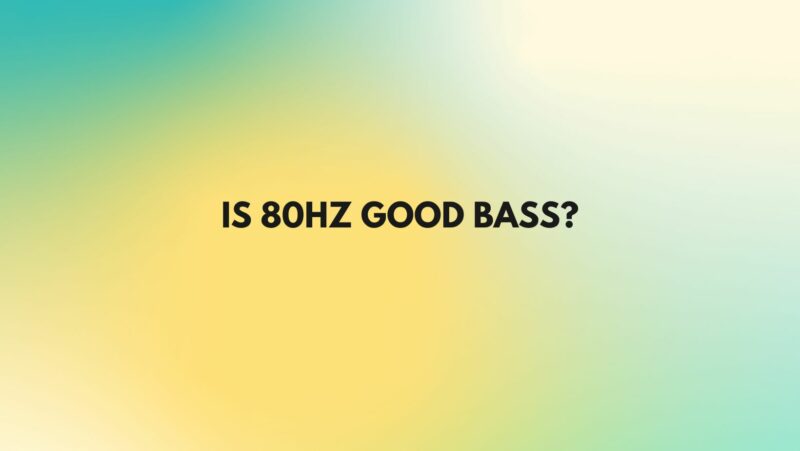The world of audio and music production is filled with terminology that can sometimes be confusing, especially for those who are new to the field. One common question that often arises is whether 80Hz is considered good bass. In this comprehensive article, we’ll explore the concept of 80Hz as it relates to bass frequencies, discussing its role in music, its impact on sound quality, and how it is used in various audio contexts.
Understanding Bass Frequencies
Before delving into the specific frequency of 80Hz, it’s essential to have a basic understanding of bass frequencies. In the context of music and audio, “bass” generally refers to the lower frequencies of the audio spectrum, typically ranging from 20Hz to 250Hz. This range includes the sub-bass, bass, and lower midrange frequencies. These frequencies provide the foundation, depth, and warmth of a musical composition.
The Role of 80Hz in Bass Frequencies
At 80Hz, we are firmly in the bass frequency range. 80Hz is often associated with the upper end of the sub-bass region, as it sits just above the typical crossover point between subwoofers and main speakers in audio systems. Here’s what you need to know about the role of 80Hz in audio:
- Impact on Sound: 80Hz is a crucial frequency for many musical genres, as it carries the weight and impact of bass instruments, such as bass guitars and kick drums. It contributes to the overall groove and rhythm of a song, making it an essential element in various music styles, including rock, hip-hop, and electronic dance music (EDM).
- Speaker Crossover: In audio systems, especially in home and professional setups, 80Hz is often used as the crossover point between the subwoofer and the main speakers. This means that frequencies below 80Hz are sent to the subwoofer for better handling of low-end content, while higher frequencies are directed to the main speakers. This setup ensures that each component plays to its strengths, resulting in cleaner and more efficient sound reproduction.
- Room Acoustics: The effectiveness of 80Hz as “good bass” can also depend on the acoustics of the room in which you are listening. Some rooms may naturally amplify or attenuate certain frequencies, including 80Hz. Room treatments and speaker placement play a significant role in optimizing bass response.
- Musical Context: The suitability of 80Hz as good bass also depends on the musical context. While 80Hz can provide satisfying bass in many situations, some genres or specific musical compositions may require lower sub-bass frequencies or higher bass frequencies to achieve the desired sonic character.
Customizing Bass Frequencies
It’s important to note that “good bass” can be subjective and context-dependent. The ideal bass frequency range varies from one situation to another. Here are a few ways in which bass frequencies, including 80Hz, can be customized to suit different preferences and needs:
- Equalization (EQ): Audio engineers and enthusiasts often use EQ to boost or cut specific frequency ranges, including 80Hz, to achieve the desired tonal balance. This allows for customization of bass response to match the music and listening environment.
- Subwoofer Adjustments: Subwoofer settings, such as volume, crossover frequency, and phase, can be adjusted to optimize bass performance in a given room and with specific audio content.
- Genre and Style: Different musical genres and production styles may emphasize different aspects of bass frequencies. For example, electronic music may focus on sub-bass rumble, while jazz might prioritize the warmth of the double bass.
Conclusion
In conclusion, whether 80Hz is considered “good bass” depends on various factors, including musical context, personal preferences, and the capabilities of your audio system. In many cases, 80Hz plays a significant role in delivering satisfying bass impact and rhythm, especially when properly managed through speaker crossover settings and room acoustics. However, it’s essential to recognize that the concept of good bass is subjective and can vary from one listener to another. Ultimately, the “goodness” of 80Hz as bass is in the ears of the beholder and how it complements the music they are experiencing.


